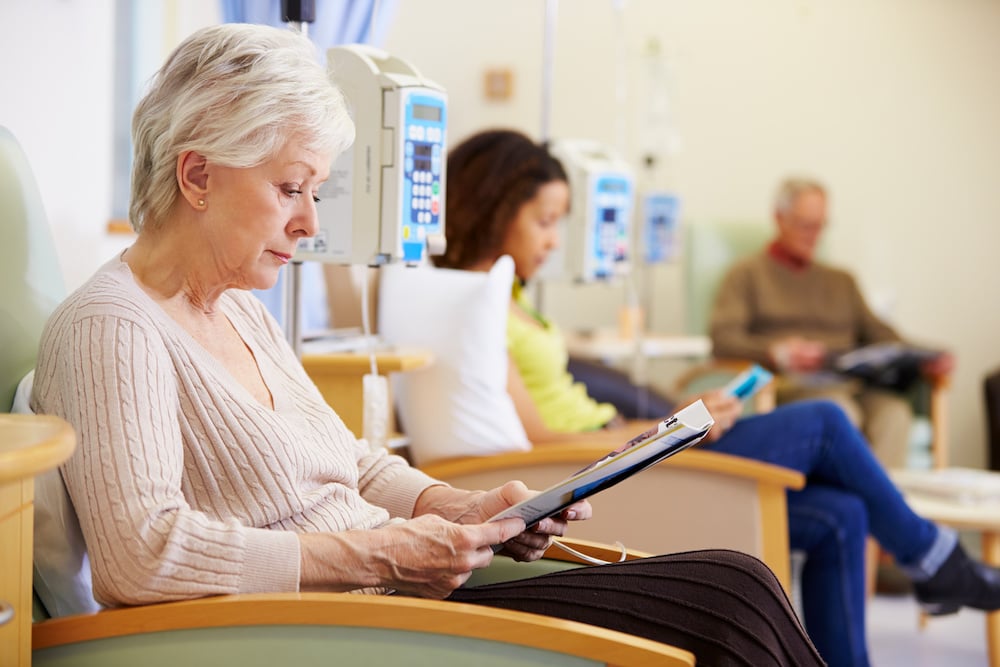How to Prepare for Colorectal Cancer Treatment Side Effects
5 min read

While there are several different treatments for colorectal cancer, a common approach is chemotherapy after surgery. For most colorectal cancer patients, this involves a chemotherapy regimen called FOLFOX. FOLFOX isn’t a single chemotherapy drug but rather a combination of chemo drugs that include folinic acid (FOL), fluorouracil (F), and oxaliplatin (OX). It is administered as an intravenous (IV) infusion for several hours. Some patients take it home for a 24-hour infusion.
When told chemo is part of the recommended cancer treatment plan, most people assume they will experience side effects, such as nausea and hair loss. You may not realize that the side effects of various chemo drugs are different. Some include hair loss, and some don’t.
Let’s look at the side effects most common for patients receiving FOLFOX. The more aware you are of the side effects you could experience, the better prepared you can be to manage them if or when they arise.
Common Colorectal Chemo Side Effects
Some of the side effects are common for all types of chemotherapy, while others are more specific to this drug combination.
Fatigue
Fatigue is a side effect almost every cancer patient feels, regardless of the type of cancer they’re being treated for. Unlike tiredness that goes away after rest, the exhaustion associated with fatigue can be so debilitating that you can’t function normally.
How to prepare: Try to get comfortable with the idea that you won’t be able to do it all, but know that it will get better with time. Talk openly and honestly with your friends and family, letting them know you might need help. Also, let them know that you might not be able to commit to activities for a while since your ability to participate will depend on how you feel. Keep your energy up by being active, even if it’s just for 15-20 minutes at a time. Take a walk or turn on some music that makes you happy so you can dance for a bit.
Proper nutrition also helps relieve fatigue. Try to plan healthy meals or ask for help from loved ones to prepare dishes for a well-rounded diet.
Abdominal and Bowel Issues
Because colorectal cancer treatment focuses on the gastrointestinal area, it can cause issues such as abdominal discomfort and changes in bowel movements. Most patients experience bowel movement change, whether constipation, diarrhea, or both. Unfortunately, this can lead to other uncomfortable side effects, including flatulence (gas), bloating, cramping, and dehydration.
How to prepare: You can start by stocking your fridge and pantry with high-fiber foods, which can help keep you regular. Plan to keep your meals simple but healthy, and aim to ingest more fluids and less sugar. It’s also a good idea to consider keeping over-the-counter stool softeners and laxatives in your medicine cabinet. You can also talk with your doctor about prescribing anti-diarrhea medicines to help.
Appetite Loss
Cancer treatments like chemotherapy may lower your appetite or change how food tastes or smells. You may also develop nausea and vomiting, which can make it a challenge to eat or drink. However, avoiding food and water can leave you weak and dehydrated, so thinking ahead is important.
How to prepare: Try making smaller meals and eat them more frequently. Stock the fridge with water and other beverages that contain electrolytes, such as coconut water, milk, and fruit juices. Do your best to avoid caffeine, alcohol, and drinks high in sugar content, including sodas. Talk with your cancer care team about any medications that could help ease nausea.
Learn about the importance of Nutrition in Cancer Care.
Physical Challenges
Treatment with FOLFOX can also cause physical challenges. Tasks that are usually easy might now be more challenging. Undergoing chemotherapy for colorectal cancer may cause you to experience difficulty walking, opening your mouth, talking, using your hands, feeling balanced, hearing, smelling, eating, sleeping, and emptying your bladder.
How to prepare: Although there isn’t much you can do to prepare for these changes, knowing they can occur is helpful. Keep in mind that these side effects are often delayed, starting around two weeks (or later) after chemotherapy treatment starts.
Weakened Immune System
Certain colorectal cancer treatments like chemotherapy damage both cancer cells and healthy cells. Unfortunately, this includes destroying cells in your immune system. The result is an increased risk for infections. One particular infection that some colorectal cancer patients develop is mucositis, which causes pain and inflammation along the digestive tract.
How to prepare: Mucositis is a common side effect of chemotherapy and radiation therapy. If either is part of your cancer care plan, take time to talk with your oncologist before starting treatment. Your colorectal cancer specialist may recommend shots that boost your white blood cell production. To strengthen your immune system overall, wash your hands regularly, eat a nutritious diet, and avoid contact with other sick individuals.
Neuropathy
Peripheral neuropathy results from damage to the nerves outside the brain and spinal cord, including your hands and feet. FOLFOX can cause neuropathy, resulting in a tingling sensation or numbness in the extremities. You may notice it more after every treatment, and it may be worsened by exposure to the cold.
How to prepare: While you aren’t likely to avoid neuropathy altogether, you can avoid exposure to the cold. Hypersensitivity to cold can increase pain in your hands, feet, and face. It’s a good idea to keep gloves by the refrigerator so you can put them on before grabbing anything inside. Also, in the Colorado winters, you need to wear cold-weather gear, such as gloves to protect your hands and scarves to protect your face and ears, every time you go outside.
Hair Thinning
While hair loss is a common side effect of many chemotherapy treatments, it’s rare with FOLFOX. With that said, you may notice hair thinning. If any of your hair does fall out, it will grow back after treatment has finished.
How to prepare: Keep a gentle shampoo on hand and reduce how often you wash your hair during the week. Be sure to moisturize with conditioner each time you wash. Brush and comb your hair gently. If your hair is getting too thin, consider a new hairstyle. Shorter hair tends to be easier to manage when hair is thinning.
Long-Term Side Effects of FOLFOX Colorectal Cancer Treatment
While most side effects disappear after treatment ends, others stick around longer. Some, like fatigue and bowel issues, may even last months after treatment is complete. This can also be due to any surgery you may have had. Remember, it’s normal, as your body has much healing to do!
The good news is that those lingering side effects usually improve over time. However, peripheral neuropathy could be permanent for some patients.
Your oncologist can do a brief exam to test your sensitivity, along with other lab tests and imaging tests. The doctor will prescribe a tailored treatment plan with a physical therapist based on the test results. While peripheral neuropathy can’t be cured, it can be managed.
Colorectal Cancer Treatment in Colorado
Although side effects during colorectal cancer treatment are inevitable, you can get a better handle on them by preparing in advance as much as possible. Be sure to talk with your oncologist and infusion room nurses about any side effects you’re experiencing. They can give you practical advice for managing your specific side effects and may also know of medications that can give you relief.
If you have been diagnosed with colorectal cancer, know that the cancer specialists at Rocky Mountain Cancer Centers are here to help. Find a location in Denver, Boulder, Colorado Springs, or throughout the Front Range to schedule an appointment.


